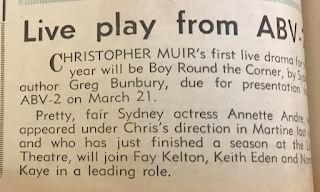An Australian play. The first of six plays by Australian writers the ABC made in 1962.
Premise
Nev Hallors owns a
cafe in Erskineville and regards Gerry Lacey and his 16 year old sister Sue like his own
children ever since the death of their mother. Gerry and Sue are the children of a shoemaker friend of Nev's. Gerry has quarrelled with his father and left home, his old factor job and all his old friends.Gerry wnts easy money and doesn't care where it comes from. Because he won't come home, Sue meets Gerry every Friday night at the cafe.
When the play opens, Sue is waiting for Gerry, bubbling with happiness because it is her birthday. She starts talking to Shannon, a middle aged man sitting at one of the tables. Shannon is seeking information about his brother's death the previous night. His brother was a taxi driver found dead in his car on a lonely road after a smash. The police say it was an accident but Shannon is convinced there was a passenger in the cab. Sue is moved by Shannon's story.
Gerry is hiding in the backroom of the cafe. He is badly hurt but refuses to allow Nev to call a doctor. Gerry confesses he tried to rob a taxi the previousl night and feels morally responsible for the crash and the dirver's death. He is trying to find the courage to go to the police.
Nev persuades Gerry to allow him to get medical help. Gerry, terrified of being alone, bursts into the cafe and fins Shannon, Sue and Carrie, Gerry's socirty girlfriend. Shannon realises that Gerry is the man he is looking for and must decide what to do.
Cast
- Paul Karo as Gerry Lacey
- Annette Andre as Carrie
- Keith Eden – Nev Hallors
- Norman Kaye as Shannon
- Fay Kelton as Sue
- Frederick Parslow as Don
- Roma Johnston as Rene Hallors
Production
It was based on a script by short story writer Greg Bunbury. He had written, acted and produced with amateur repertory groups in Sydney. In the 1970s he wrote a play A Visit with the Family.
It was
the first of six TV plays by Australian writers which the ABC made in 1962.
The show was shot in Melbourne, although set in Sydney's
industrial west. Chris Muir researched it by visiting cafes in
Melbourne's industrial suburbs.
Annette Andre had previously worked with Muir in Martine. She later said "I think it was the last thing I did before going to England. I have no recall of it except I know I liked working with Chris."
Reception
The Sydney Morning Herald gave the production a mixed review, saying:
If it did little else...[the play] showed that some,
extraordinarily strong things can happen, in an Erskineville cafe. To;
Mr Bunbury's credit, Erskineville and its inhabitants are not distorted;
but the play is so feebly balanced and so afflicted by dramatic inertia
that it often seemed the locality was a prime reason for the writing of
the play. Stock characters include the proprietor, a kind of fatherly
confessor; a sweet and trusting 16-year-old girl; a society girl with
alt attitude; her rather vacuous boy friend; 3 reminiscing middle-aged
man —they are all there. The drama in the story hinges on the
16-year-old girl's brother who appears in the cafe owner's living-room
badly hurt after being in a taxi which has crashed, killing tin driver.
The outstanding value of the play lies in its close and warm observation
of brother-sister dependence; and fortunately the actors concerned were
well able to suggest the beautiful locking of affection between the
two. Fay Kelton was an amiable natural girl; Paul Karo an extremely
worried young man, wincing with pain from a shattered shoulder and
communicating some of 'that pain to the viewer. Christopher Muir's
production was careful, and Cass van Puffelen's sets could hardly have
been bettered—although the deliberate tilting of three wall objects in
the proprietor's living-room was a fastidious and unwelcome touch.
TV Times said "it has good dialogue, an interesting plot, and a mixed bunch of characters, some of whom were convincing written, some quite unconvincing... the actors were better than the story."
Listener In gave it a hostile review.
 |
TV Times 16 Aug 1962 p 13
|
 |
TV Times 7 March 1962
|
 |
TV Times Vic 22 Feb 1962
|
 |
TV Times Vic 4 April 1962
|
 |
Listener In
|
 |
NAA Syd 62
|


































No comments:
Post a Comment